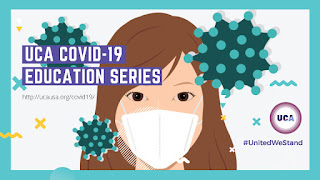32: How to decrease risk of infection if you are in a high-risk category?
Q: What steps should I take to decrease my risk of infection if I’m in a high-risk category?
💁Tracy: If you are age 65 or above or are in a high-risk category, stay home and pay attention to signs of illness. Refer to our article “What should I do if I’m at a greater risk for infection or if members of my household have this risk?” to learn about symptoms. Have all members of your household stay home as well.
The following steps may be helpful for you to stay home and stay safe:
If you have chronic illnesses such as high blood pressure and diabetes, take your medications as prescribed, talk to your doctors about how to do self-monitoring at home, such as measuring blood pressure and blood sugar levels, and be sure to know the warning signs and symptoms. Schedule regular telemedicine appointments with doctors for follow up.
💁Tracy’s Tip:
Your mental health is as important as your physical health. Pay attention to symptoms of anxiety and depression. If you are experiencing them, talk to friends or healthcare providers and follow “Tracy’s suggestions for those who live alone or are struggling to cope with isolation.”
Resources:
💁Tracy: If you are age 65 or above or are in a high-risk category, stay home and pay attention to signs of illness. Refer to our article “What should I do if I’m at a greater risk for infection or if members of my household have this risk?” to learn about symptoms. Have all members of your household stay home as well.
The following steps may be helpful for you to stay home and stay safe:
- Use delivery services for groceries, medications, and other items you may need. Pay with a credit card when you order, so you do not have to come in physical contact with the delivery person. Leave an envelope containing any gratuity outside for them.
- Keep some canned and frozen goods at home, and extra medications on hand in case delivery orders are delayed. This ensures you have enough supplies and dietary needs at home.
- Have a friend or family member shop for you and leave the items as mentioned above.
- Discuss using telemedicine platforms with any medical professionals you need to visit.
If you have chronic illnesses such as high blood pressure and diabetes, take your medications as prescribed, talk to your doctors about how to do self-monitoring at home, such as measuring blood pressure and blood sugar levels, and be sure to know the warning signs and symptoms. Schedule regular telemedicine appointments with doctors for follow up.
- If you have to go out, you must wear masks, avoid touching the face, stay at least six feet away from others, and wash hands or use hand sanitizer frequently. You may need to shower and change clothes upon returning home, sanitize surfaces you have touched, and launder clothing items.
- Shop during the time that stores have set aside for at-risk people.
- Stay in touch with friends and family, keep them being informed about your situation and what to do in case of emergency. This will help you reduce stress and feelings of isolation.
- Establish routines for your daily activities. Routines give us a sense of normalcy.
- Exercise regularly. Consult with your doctor about whether it would be safe for you to exercise outside while following the guidelines in “Is it safe to go for a walk or run in a park?” and about any changes you are making to your exercise routine in response to the pandemics.
- Take adequate rest and sleep.
💁Tracy’s Tip:
Your mental health is as important as your physical health. Pay attention to symptoms of anxiety and depression. If you are experiencing them, talk to friends or healthcare providers and follow “Tracy’s suggestions for those who live alone or are struggling to cope with isolation.”
Resources:
- https://www.nfid.org/infectious-diseases/common-questions-and-answers-about-covid-19-for-older-adults-and-people-with-chronic-health-conditions/
- https://www.cdc.gov/coronavirus/2019-ncov/need-extra-precautions/older-adults.html
Writing: Debbie Vilardi; Proofreading: Li Ou, Helen Shih, Shan Chen, Mingdi Yang; Artwork: Yvonne Xia
Disclaimer and Copyright © 2020 United Chinese Americans










